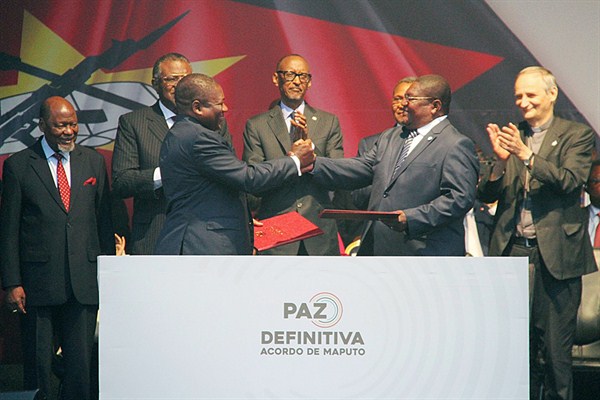The peace agreement signed recently in Mozambique by President Filipe Nyusi and the head of the former rebel group Renamo, now a political party, addresses the two critical issues that have festered since an accord in 1992 never fully ended the country’s civil war. The deal includes provisions for the full demobilization of Renamo fighters, with the integration of selected Renamo personnel into the armed forces, and the decentralization of political power. It is the second attempt to end renewed conflict between rebels and the government since 1992, following an earlier agreement in 2014 that was supposed to end a Renamo insurgency. The latest deal represents progress, but as ever in Mozambique, uncertainty remains.
The agreement finalized terms forged through direct discussions between Nyusi and Renamo’s longtime leader, Afonso Dhlakama, that began at the end of 2016. Dhlakama died of natural causes in May 2018; Ossufo Momade, who was elected in a Renamo party congress in January, succeeded him and signed the deal with Nyusi in early August.
Under the terms of the new deal, 5,221 Renamo fighters will be disarmed and demobilized. A handful of senior Renamo officers have already been integrated into Mozambique’s armed forces and national police. The 1992 peace deal that put an end to 16 years of fighting between Renamo and the government had also provided for the integration of Renamo officers into the armed forces, but not the police. Instead, the ruling Frelimo party funneled many of its demobilized soldiers into elite police units, which ultimately undermined that deal. The question of meaningful security sector reform also stayed off the table, and Renamo was allowed to retain men under arms to serve as Dhlakama’s personal guards. Thus, despite the civil war’s formal end after 1992, Renamo remained an armed political party, while Mozambique’s military and police retained politicized and partisan overtones. Both factors contributed to Renamo launching its insurgency in 2013.

